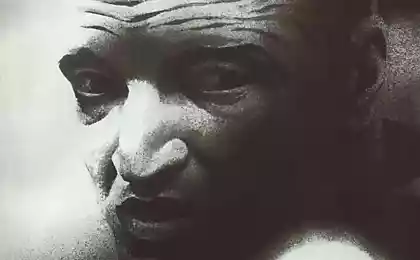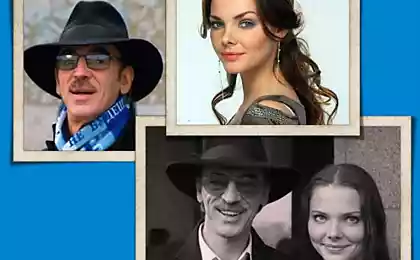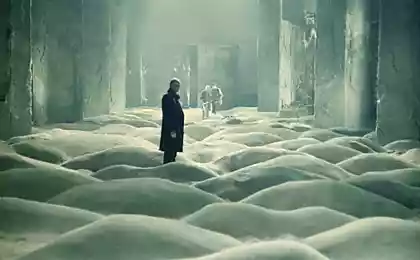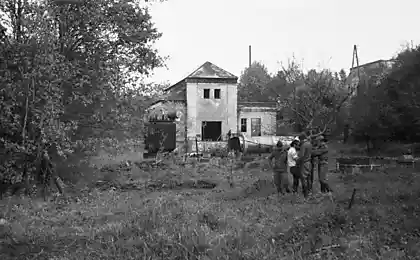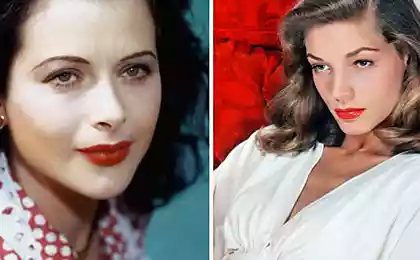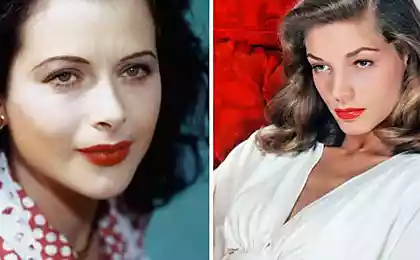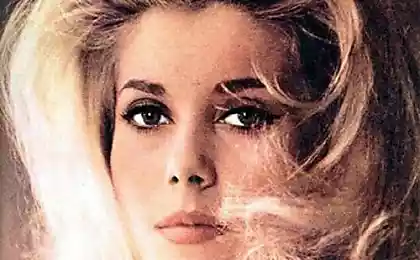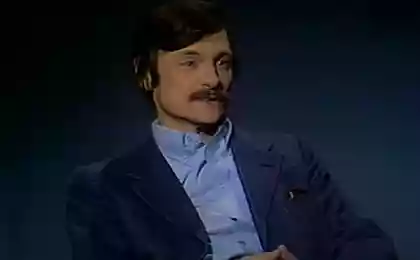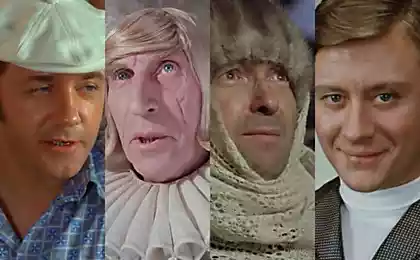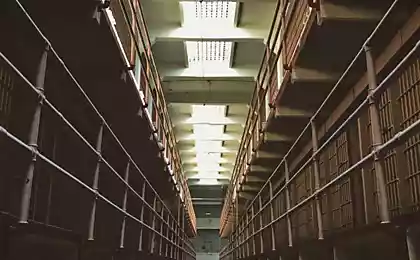262
Why the wife of Andrei Tarkovsky was considered the wrong party
Andrei Tarkovsky has been gone for more than 30 years, but his memory lives on. The director was considered a real symbol of author’s cinema, and colleagues assured that he was the “god of cinema”. His films were not easy to watch, but they were fascinating and forced to follow what was happening on the screen to the end. No wonder we're still here today. Tarkovsky's best films It's really interesting.
And today's edition. "Site" Offers not only to recall the 5 most significant works of the great director, but also to reveal the secret of his personal life. Under what conditions Andrei Tarkovsky had to create, and why his work was especially difficult for his loving wife, Larisa.
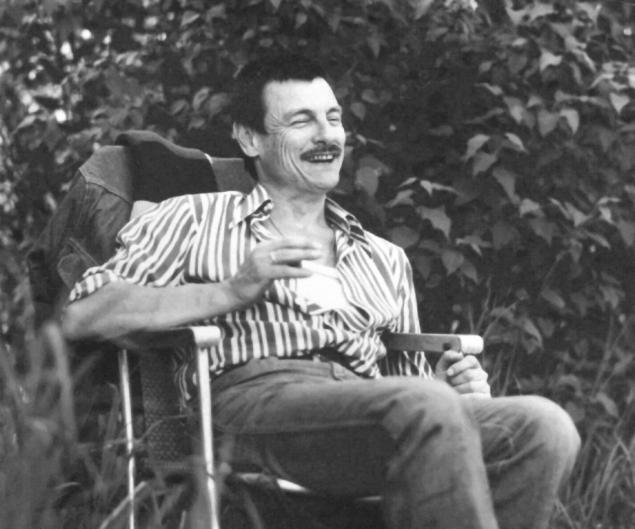
GettyImages Tarkovsky's Best Films
The difficult character of the man manifested itself in his personal life, but he lived with his first wife Irma Rausch for 13 years. Colleagues considered them a harmonious couple, and therefore Andrei’s romance with Larisa Kizilova was not taken seriously. Irma herself, after catching her husband with Larisa, easily believed that she just gives the director a massage. She had no idea that this woman could be her rival.
View this post on Instagram
Andrei Tarkovsky is a great Russian film director. His films are included in all lists of masterpieces of world cinema. He was praised by Wim Wenders, Lars von Trier, and Akira Kurosawa. Every plot becomes for Tarkovsky an occasion for reflections on the nature of man, on the eternal categories of human consciousness - about memory and unconsciousness, about conscience, about the soul. His films are always a complex world of multidimensional and multi-valued symbols, the solution of which requires the viewer to exert maximum emotional and intellectual forces. According to the director himself, cinema was for him an occupation “moral”, he considered “it is necessary to keep the view of art as something extremely serious, responsible, not fitting and such concepts as, say, theme, genre, form, etc.” .Е️ His work had a huge impact on Soviet and world cinema, and for many became a source of inspiration. Famous Italian director Federico Fellini said: “If I had not seen Tarkovsky’s film Ivan’s Childhood, I would never have made Eight and a Half.” We have made for you our selection of films for the week: ????????????????????????????????????????????????????????????????????????????????????????????????????????????????????????.............
A post shared by AZ Museum | AZ Museum (@az_museum) on May 25, 2020 at 9:07am PDT
And yet Larissa became not only a fleeting companion of Tarkovsky, but also a full-fledged wife for 16 years - until the last days of Tarkovsky's life. She addressed the filmmaker to "you", frankly flattered him and cooked wonderfully. Even staying in a hotel, she managed to fry the wife of the cutlet and cook borsch.
What was he holding with that woman? He regularly fell in love and had affairs on the side. Larisa learned and arranged scandals, but it did not bring results. It is not surprising, considering some of the director’s statements.
“A woman does not have an inner world of her own and should not have one. Her inner world should completely dissolve in the inner world of a man, Tarkovsky once said in an interview.
View this post on Instagram
There is no doubt that if there was not this famous Khrushchev thaw, one could hardly count on any career that would have taken place in my country. Of course, I was at a good time in terms of starting my job. Very successful. As for parties, the artist should not belong to any parties. That is the meaning of creativity that the artist expresses his personal, individual, I would say personal, point of view. Because creativity expresses most vividly, like no other phenomenon or phenomenon, what we call the meaning of the personality - its content, its content. I think Dostoevsky was right when he said that he did not belong to any direction. Art associated with any direction is in some sense flawed. Therefore, of course, technically I belong to the generation of the Twentieth Congress, and it is only natural that I aspired and aspired to always be myself. #Andrey_Tarkovsky #AndreyTarkovsky #Tarkovsky #Sixties
A post shared by Sixties (@publ_60) on May 27, 2020 at 4:47am PDT
And yet Larisa forgave her husband, arranged holidays for him almost every day, toasted for his talent. She took care of him like a child, and he appreciated it. Tarkovsky’s best films are largely her credit.
View this post on Instagram
From the cinematology of A. Meneghetti based on the film by A. Tarkovsky “Solaris”, 1972 Almost always the great directors who shoot the most famous films touch the viewer not so much with their professional or artistic skills, but with their ability to control the imagination and program of the unconscious complex. Tarkovsky tells his dreams through his films. The Mirror presents the formation of the complex, in Solaris - its action and how it ends for an adult. This film presents a wonderful opportunity to realize the projections of our own unconscious: how images, actions, our choices arise. There is nothing sci-fi about Solaris: it is an inner drawing of the daily reality of each person’s individual life. Solaris can be seen as unconscious. Imagine this journey beyond reality, into the depths of each of us. Detailed cinemalogy on the film "Solaris" can be found in the book A. Meneghetti Ontopsychological Cinemalogy. #ontopsychological synemalogy#sinemalogy#cinelogia#ontopsychology#antonyomenegetti#film#ontokniga#Tarkovsky#Andreitarkovsky#solaris
A post shared by Cinemalogy (@cinelogia.onto) on Apr 6, 2020 at 3:20am PDT
Once, even a close friend of his wife became pregnant from the director. After learning the truth, Larissa did what no one would have done: she paid her friend for an abortion.
Over the years, Tarkovsky gave his wife control over all his affairs, completely becoming creative. In his personal diary, he once noted: “Without Larochka, I would have been long gone.” Sometimes he even had to live on his salary. Larisa herself noted that her mission is to save the genius from himself.
“Yes, I have a hard time. But I forgive him for everything, this is my cross. My life commitment to a great man. I have to save him so he can make films. For history, for eternity, said Tarkovsky.
View this post on Instagram
Larisa Tarkovsky – the Ryazan muse of the director Wife and assistant to the great Russian director Andrei Tarkovsky Larisa Kizilov spent all her childhood in the Ryazan village of Avdotyinka. Her mother was born there and many relatives lived there. Larisa Tarkovsky is an extraordinary person: she starred in the Mirror, worked as an assistant director on most of his films. Meanwhile, Tarkovsky’s biographers and many of his friends treated her ambiguously, accusations against her cannot be counted. Read more on the website domostroymedia.ru #DomStroy #Domostroymediaro #Not working Mood #LarisaTarkovskaya
A post shared by @domostroymedia.ru on May 2, 2017 at 1:33am PDT
The director died in 1986. However, even after his departure, Larissa could not find common ground with his entourage and even with the management of the foundation in his name. They believed that the woman unceremoniously appointed herself the muse of a genius, brazenly dissuaded him from friends and family. After 11 years, this struggle was not Larissa herself.
Photo at preview and in article
And today's edition. "Site" Offers not only to recall the 5 most significant works of the great director, but also to reveal the secret of his personal life. Under what conditions Andrei Tarkovsky had to create, and why his work was especially difficult for his loving wife, Larisa.

GettyImages Tarkovsky's Best Films
- Ivan's Childhood (1962)
Before the shooting of the picture, Andrei Arsenyevich wondered whether he could make a film about the war. In the center of the plot was a 12-year-old boy from whom the Nazis took his family. In dreams, the guy continues to live his former carefree life, and in reality he is forced to fight. In the end, the film was extremely successful. It was this film that brought the first Venetian Golden Lion to domestic cinema.
View this post on Instagram
Let's make love not war. One of the most heartfelt kisses in the history of cinema in Andrei Tarkovsky’s piercing film Ivan’s Childhood. His film debut, which won the main prize of the Venice Festival. The story of war, destroyed childhood and murdered love. Happy Victory Day! Please, let’s not repeat this again. #9th #filmwar #kissing #war #love #Ivanobegetting #Tarkovsky #winning #makelovenotwar #never repeat
A post shared by Natalia Shastik (@amour_toujours_forever) on May 9, 2019 at 3:13am PDT - Andrey Rublev (1966)
Biographical tape, revealing the character, state of mind and great gift of the Russian painter. A significant film that also demonstrates life in Russia in the XV century. View this post on Instagram
In general, Tarkovsky considered his best work Mirror (and not without reason). I appeal to those who have not watched, guys, start with Andrei Rublev. Do not look, for God's sake, this slag of the type of Sveta Sokolova and Arrhythmia. This is degradation in its pure form! #Andreitarkovsky #Tarkovsky #Andreyrublev #Soviet film #Anatolyissolonitsyn #Solonitsyn #mirror #Andreyrublefilm #movie
A post shared by @ ramyal.yagyab on Sep 27, 2018 at 9:58pm PDT - Solaris (1972)
The film adaptation that caused the conflict between Andrei Tarkovsky and the author of the story Stanislav Lem. The writer wanted the story of extraterrestrial contact to be depicted with an emphasis on special effects. However, Tarkovsky himself decided to do everything in his favorite manner - heartfelt dialogue and a protracted plot. The success of the film proves that the director was right. View this post on Instagram
For the second time in a week (and probably 15 in a lifetime) I watched Solaris. I’ve heard that many people who have seen this movie before can’t. Too long shots, too long narrative, too slow-moving action. And for me, on the contrary, quarantine and lack of haste returned the charm of contemplating the once favorite films of favorite directors. Why don't we just sit down? The question of the collision with the future, with the unknown in space – as the author of the novel Lem and, accordingly, the author of the film who shares his view – is that it will be in any case unexpected, that is, so unexpected that you can not even prepare for it. The only thing that can be done is to try to look critically at the ways in which we cognize: by combating stereotypes of thought, those blocks of logical stereotypes that often replace us with minutes of reflection. Confronting something unknown will require strict moral discipline. That is why the hero’s father says that everything is very fragile there – referring rather to the inertia of human thinking, the way people behave in the face of this unknown: as long as the unknown. And not in order to preserve ourselves, although this also matters, but in order not to injure the unknown, to which human thought first touches. How fresh and relevant, isn't it?! #Tarkovsky #solaris #moekino #favorite movies
A post shared by ???????????? (@pola_ruger_design) on May 17, 2020 at 5:33pm PDT - "Mirror" (1974)
The dramatic film-confession was conceived in the early 70s, but then the director did not receive permission to shoot it. He wanted to talk about his childhood, about the moment when his father left the family. The picture was ruled and returned for revision many times, and then allowed to show only in 3 cinemas of the capital. The director had to show "The Mirror" secretly. View this post on Instagram
Andrei Tarkovsky on the set of his fourth picture “Mirror”. On the left is actress Terekhova, who co-starred in the film. #andreytarkovsky #tarkovsky #tarkovskyfilms #themirrorfilm #mirrorfilm1974 #filmmirkowski #Tarkowski #Andreyarsenyevich #Andreitarkowski #Terekhova #author's film #world directorship #Soviet arthouse #mosfilm #poetvkino #andreitarkovsky #andreitarkovski #criterioncollection
A post shared by allenatore Lucania (5555) ??? (@melquiadescir) on Sep 25, 2019 at 9:34am PDT - "Stalker" (1979)
After reading the story “Picnic on the Roadside”, Tarkovsky invited the Strugatsky brothers to write a script for the film. Respecting the talented director, science fiction agreed. At that time, they did not know that the work would have to be rewritten about 15 times. Filming was heavy. Andrey Arsenyevich first scandalized with one operator, then with the second. All the material used in a couple of weeks was destroyed and started from scratch. The exhausted actors then swore that they would no longer work with Tarkovsky.
However, the effort paid off. And although the film was initially accepted ambiguously, but at the Cannes Film Festival the picture was immediately noted, and the director soon received the title of People's Artist.
View this post on Instagram
A great film... Classic... #stalker #stalkerfilm #stalkeralert #stalker
A post shared by Vasya Baychurin (@s.t.a.l.k.e.r._mechenyi) on Jan 22, 2019 at 4:22am PST
The difficult character of the man manifested itself in his personal life, but he lived with his first wife Irma Rausch for 13 years. Colleagues considered them a harmonious couple, and therefore Andrei’s romance with Larisa Kizilova was not taken seriously. Irma herself, after catching her husband with Larisa, easily believed that she just gives the director a massage. She had no idea that this woman could be her rival.
View this post on Instagram
Andrei Tarkovsky is a great Russian film director. His films are included in all lists of masterpieces of world cinema. He was praised by Wim Wenders, Lars von Trier, and Akira Kurosawa. Every plot becomes for Tarkovsky an occasion for reflections on the nature of man, on the eternal categories of human consciousness - about memory and unconsciousness, about conscience, about the soul. His films are always a complex world of multidimensional and multi-valued symbols, the solution of which requires the viewer to exert maximum emotional and intellectual forces. According to the director himself, cinema was for him an occupation “moral”, he considered “it is necessary to keep the view of art as something extremely serious, responsible, not fitting and such concepts as, say, theme, genre, form, etc.” .Е️ His work had a huge impact on Soviet and world cinema, and for many became a source of inspiration. Famous Italian director Federico Fellini said: “If I had not seen Tarkovsky’s film Ivan’s Childhood, I would never have made Eight and a Half.” We have made for you our selection of films for the week: ????????????????????????????????????????????????????????????????????????????????????????????????????????????????????????.............
A post shared by AZ Museum | AZ Museum (@az_museum) on May 25, 2020 at 9:07am PDT
And yet Larissa became not only a fleeting companion of Tarkovsky, but also a full-fledged wife for 16 years - until the last days of Tarkovsky's life. She addressed the filmmaker to "you", frankly flattered him and cooked wonderfully. Even staying in a hotel, she managed to fry the wife of the cutlet and cook borsch.
What was he holding with that woman? He regularly fell in love and had affairs on the side. Larisa learned and arranged scandals, but it did not bring results. It is not surprising, considering some of the director’s statements.
“A woman does not have an inner world of her own and should not have one. Her inner world should completely dissolve in the inner world of a man, Tarkovsky once said in an interview.
View this post on Instagram
There is no doubt that if there was not this famous Khrushchev thaw, one could hardly count on any career that would have taken place in my country. Of course, I was at a good time in terms of starting my job. Very successful. As for parties, the artist should not belong to any parties. That is the meaning of creativity that the artist expresses his personal, individual, I would say personal, point of view. Because creativity expresses most vividly, like no other phenomenon or phenomenon, what we call the meaning of the personality - its content, its content. I think Dostoevsky was right when he said that he did not belong to any direction. Art associated with any direction is in some sense flawed. Therefore, of course, technically I belong to the generation of the Twentieth Congress, and it is only natural that I aspired and aspired to always be myself. #Andrey_Tarkovsky #AndreyTarkovsky #Tarkovsky #Sixties
A post shared by Sixties (@publ_60) on May 27, 2020 at 4:47am PDT
And yet Larisa forgave her husband, arranged holidays for him almost every day, toasted for his talent. She took care of him like a child, and he appreciated it. Tarkovsky’s best films are largely her credit.
View this post on Instagram
From the cinematology of A. Meneghetti based on the film by A. Tarkovsky “Solaris”, 1972 Almost always the great directors who shoot the most famous films touch the viewer not so much with their professional or artistic skills, but with their ability to control the imagination and program of the unconscious complex. Tarkovsky tells his dreams through his films. The Mirror presents the formation of the complex, in Solaris - its action and how it ends for an adult. This film presents a wonderful opportunity to realize the projections of our own unconscious: how images, actions, our choices arise. There is nothing sci-fi about Solaris: it is an inner drawing of the daily reality of each person’s individual life. Solaris can be seen as unconscious. Imagine this journey beyond reality, into the depths of each of us. Detailed cinemalogy on the film "Solaris" can be found in the book A. Meneghetti Ontopsychological Cinemalogy. #ontopsychological synemalogy#sinemalogy#cinelogia#ontopsychology#antonyomenegetti#film#ontokniga#Tarkovsky#Andreitarkovsky#solaris
A post shared by Cinemalogy (@cinelogia.onto) on Apr 6, 2020 at 3:20am PDT
Once, even a close friend of his wife became pregnant from the director. After learning the truth, Larissa did what no one would have done: she paid her friend for an abortion.
Over the years, Tarkovsky gave his wife control over all his affairs, completely becoming creative. In his personal diary, he once noted: “Without Larochka, I would have been long gone.” Sometimes he even had to live on his salary. Larisa herself noted that her mission is to save the genius from himself.
“Yes, I have a hard time. But I forgive him for everything, this is my cross. My life commitment to a great man. I have to save him so he can make films. For history, for eternity, said Tarkovsky.
View this post on Instagram
Larisa Tarkovsky – the Ryazan muse of the director Wife and assistant to the great Russian director Andrei Tarkovsky Larisa Kizilov spent all her childhood in the Ryazan village of Avdotyinka. Her mother was born there and many relatives lived there. Larisa Tarkovsky is an extraordinary person: she starred in the Mirror, worked as an assistant director on most of his films. Meanwhile, Tarkovsky’s biographers and many of his friends treated her ambiguously, accusations against her cannot be counted. Read more on the website domostroymedia.ru #DomStroy #Domostroymediaro #Not working Mood #LarisaTarkovskaya
A post shared by @domostroymedia.ru on May 2, 2017 at 1:33am PDT
The director died in 1986. However, even after his departure, Larissa could not find common ground with his entourage and even with the management of the foundation in his name. They believed that the woman unceremoniously appointed herself the muse of a genius, brazenly dissuaded him from friends and family. After 11 years, this struggle was not Larissa herself.
Photo at preview and in article


